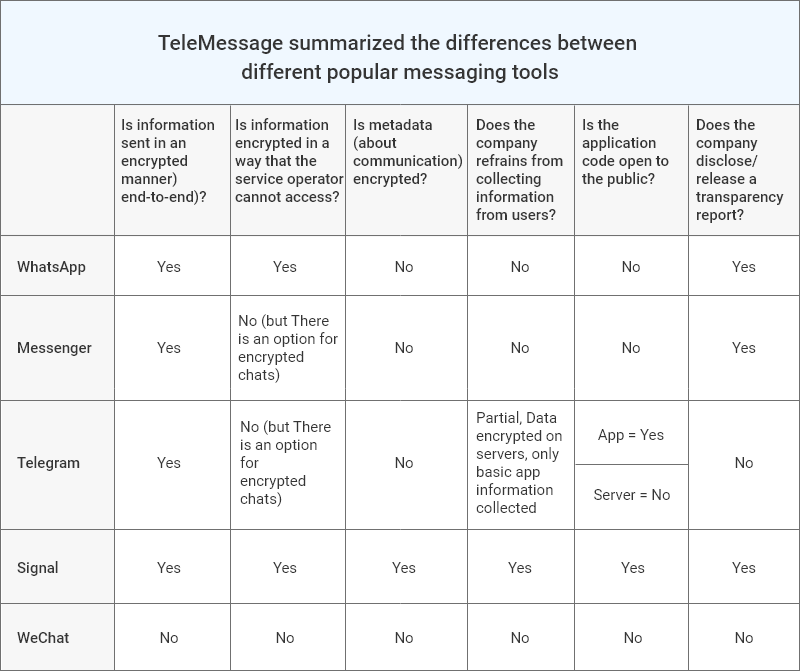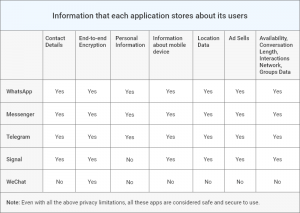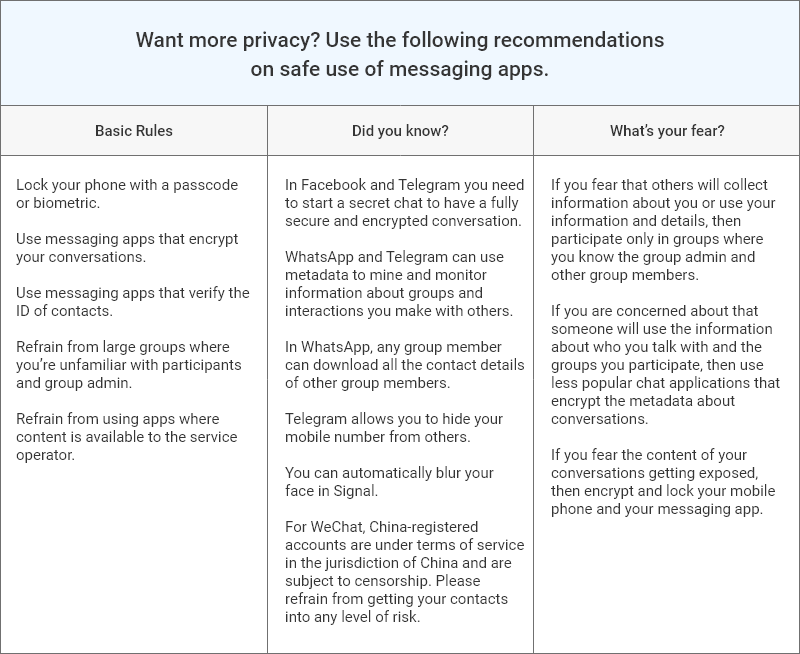The ability to communicate with fellow beings differentiates humans from all other species in this world. We have evolved from making gestures to sending messages with a tap of a button. Communication has become effortlessly simple.
Technological progress has resulted in multiple modes of communication. Phone calls and video calls enabled people to speak to each other without the need to be physically proximate. Emails, text messages, and mobile chats have further reduced the need for oral communication. Mobile chat applications like WhatsApp and WeChat not only let you send texts but also allow you to send emoticons and stickers (picture messages). Features like these help people to express their thoughts as succinctly as if they were having a live face-to-face conversation.
The use of mobile messaging applications continues to increase. Whether for business or personal use, mobile IM (Instant Messaging) applications offer a level of simplicity that cannot be compared to any other method of communication. Mobile IM applications like WhatsApp, Messenger, Telegram, WeChat, and Signal are the current trendsetters in the communication market. Despite the fact that all these applications do not have the same features, they are very similar in their basic nature of operation, offering: chats, voice calls, and video calls. But irrespective of the offered features, all users will require ‘privacy’, with a discretionary setting for how much information to reveal your information to strangers.
We discuss below how private your conversations are with your friends and family and how extensively the messages you send or receive in the mobile IM application are being seen only by you and your texting counterpart.
 How private and transparent is your mobile chat application?
How private and transparent is your mobile chat application?
End-to-end encryption is considered the gold standard with respect to data privacy in mobile chat applications. It is the practice of encrypting a message at the time of transmission and decrypting it on the recipient’s device. The advantage of using this feature is that only the sender and recipient will be able to see the messages, and no one will be able to intercept them while they are in transit. Therefore, users can rest assured that their chats are not being monitored by some stranger. People have become increasingly concerned about privacy, so most mobile messaging applications have adopted this security feature to provide data security to their users. In this manner trust between the users and the service providers will increase.
The Facebook-owned WhatsApp is the most popular and most used mobile chat application, with all WhatsApp messages end-to-end encrypted by default. But the company does not encrypt the metadata of your conversations, rendering it visible to WhatsApp. WhatsApp also collects specific user information and its application code is not available for the public review.. Finally, WhatsApp releases a transparency report outlining what kinds of data they gather from you.
Messenger is another Facebook-owned mobile messaging application that also uses end-to-end encryption. But unlike WhatsApp, conversations in Messenger are not end-to-end encrypted by default. You will have to turn on Secret Conversations to send end-to-end encrypted messages. Messenger also does not encrypt metadata of your conversations, which means Facebook can view it. In addition to this, Facebook collects user information from Messenger. Like WhatsApp, Messenger also releases a transparency report that shows the details acquired from its users, and its application code is not open to the public.
Telegram, owned by Pavel Durov, has its origins in Russia. Telegram also provides end-to-end encryption for the messages sent and received through the application. But this feature is not turned on by default for all your conversations. If you wish to have an encrypted chat, you will have to turn on the Start Secret Chat option in the profile you wish to use. The metadata of your conversations is not encrypted, either. Telegram only collects basic app information from its users. The company does not release a transparency report, but the application code is open to the public. However, their application code for the server is not available for public scrutiny.
Tencent-owned WeChat is China’s version of WhatsApp. The application isn’t popular outside the walls of China (at least not as popular as WhatsApp or Telegram), yet no other application can compete with its reach inside China. But due to the strict regulations imposed by the Chinese government, the company can only do so much in providing privacy for the user’s conversations through the application. Neither the WeChat conversations nor their metadata are end-to-end encrypted. For this reason, your WeChat conversations can be monitored by the company if they choose to do so. WeChat also collects user information. But it is unknown to what extent, as the company does not release a transparency report. WeChat also does not share its application code with the public.
If you are eager to choose a winner for the most private chat application out of the four mentioned above, then you might want to wait for the next one.
Signal is a relatively young mobile IM application compared to its competitors, and it is run by the Signal Technology Foundation. Signal’s primary concern is the privacy of its users, and for this reason, its security and transparency are unrivaled in comparison to its competitors. Signal offers end-to-end encryption by default on all conversations sent and received through it. Since the metadata of the conversation is also encrypted, there is very little chance of your conversations being leaked. Since Signal is run by a non-profit organization and relies on donations, it does not attempt to collect user data. Furthermore, by releasing a transparency report and making their application code available to the public, Signal offers better transparency for their engagement with users.
Although Signal offers greater privacy and transparency than the other mobile chat applications that we discussed above, all other applications offer user privacy in their own way. Hence, it is safe to assume that all these applications are relatively safe to use, provided we, the users are aware of how to use them.
The information stored by mobile messaging applications about their users
Most people don’t bother to read the details on the screen when installing a chat application. It is always a good idea to read the application’s terms of use so that you are aware of what information the application collects from you. Let us review the type of information that each mobile messaging application collects from its users.
 Best practices to follow while using a mobile messaging application
Best practices to follow while using a mobile messaging application
In addition to what has been said above, we offer the following additional information about the most commonly used mobile messaging applications.
As discussed earlier even though Messenger and Telegram offer end-to-end encryption for the conversations, you will have to activate the feature to use it. Despite the fact that WhatsApp and Telegram support encrypted chats, the applications do not encrypt the metadata of the conversations. Hence WhatsApp and Telegram are able to monitor the groups that you participate in, as well as your interactions with other users. Any participant of a group in WhatsApp can download the contact details of all other participants of the same group. Telegram allows you to hide your mobile number from others. Signal offers another unique feature where you can blur the faces on the photos you share. WeChat accounts registered in China fall under the terms of service in China and are subject to censorship. It is therefore not wise to share any inappropriate content using your WeChat account, as it can put you and your contacts at risk.
Additional best practices include:
- Lock your phone either with a password or a biometric, so that nobody else can access it.
- Make sure to use a mobile IM application that encrypts your conversations and verifies the ID of contacts.
- Stay away from large groups where you don’t know the participants or group admin(s). If you are being added to such groups without your consent, then you should leave them as soon as possible.
- Avoid the usage of chat applications where the service operator has access to your contacts.
A mobile messaging application that not only encrypts your conversations, but also the metadata of your conversations, gives you a private and safe chat experience.
While using WhatsApp, WeChat, or any other mobile IM application for enterprise instant messaging, applicable regulations will require you to monitor, record, and archive the conversations through such applications. TeleMessage offers recording and archiving solutions for regulated firms that use popular mobile messaging applications. The adoption of such a solution helps firms maintain regulatory compliance. The tool help firms perform activities like WhatsApp recording, Whatsapp archiving, WeChat recording, and WeChat archiving. TeleMessage will also make available tools capable of Signal archiving and Telegram archiving soon so that employees working in regulated firms can have a fully secure mobile messaging experience.
About TeleMessage
TeleMessage captures and retains mobile content, including mobile SMS messages, voice calls, and WeChat and WhatsApp conversations from corporate or BYOD mobile phones to ensure compliance with various data protection regulations. The messages are securely and reliably retained within TeleMessage servers or forwarded to your choice archiving data storage vendor.
Our mobile archiving products securely record content from mobile carriers and mobile devices for various ownership models (BYOD, CYOD, and employer-issued). With our multiple archiving solutions, you can always find the right tools or blend for your requirements:
- Network Archiver
- Enterprise Number Archiver
- Android Archiver
- WhatsApp Archiver
- WeChat Archiver
- Signal Archiver
- Telegram Archiver
TeleMessage offers cross-carrier and international mobile text & calls archiving for corporate and BYOD phones. Visit our website at www.telemessage.com to learn more about our mobile archiving products.

